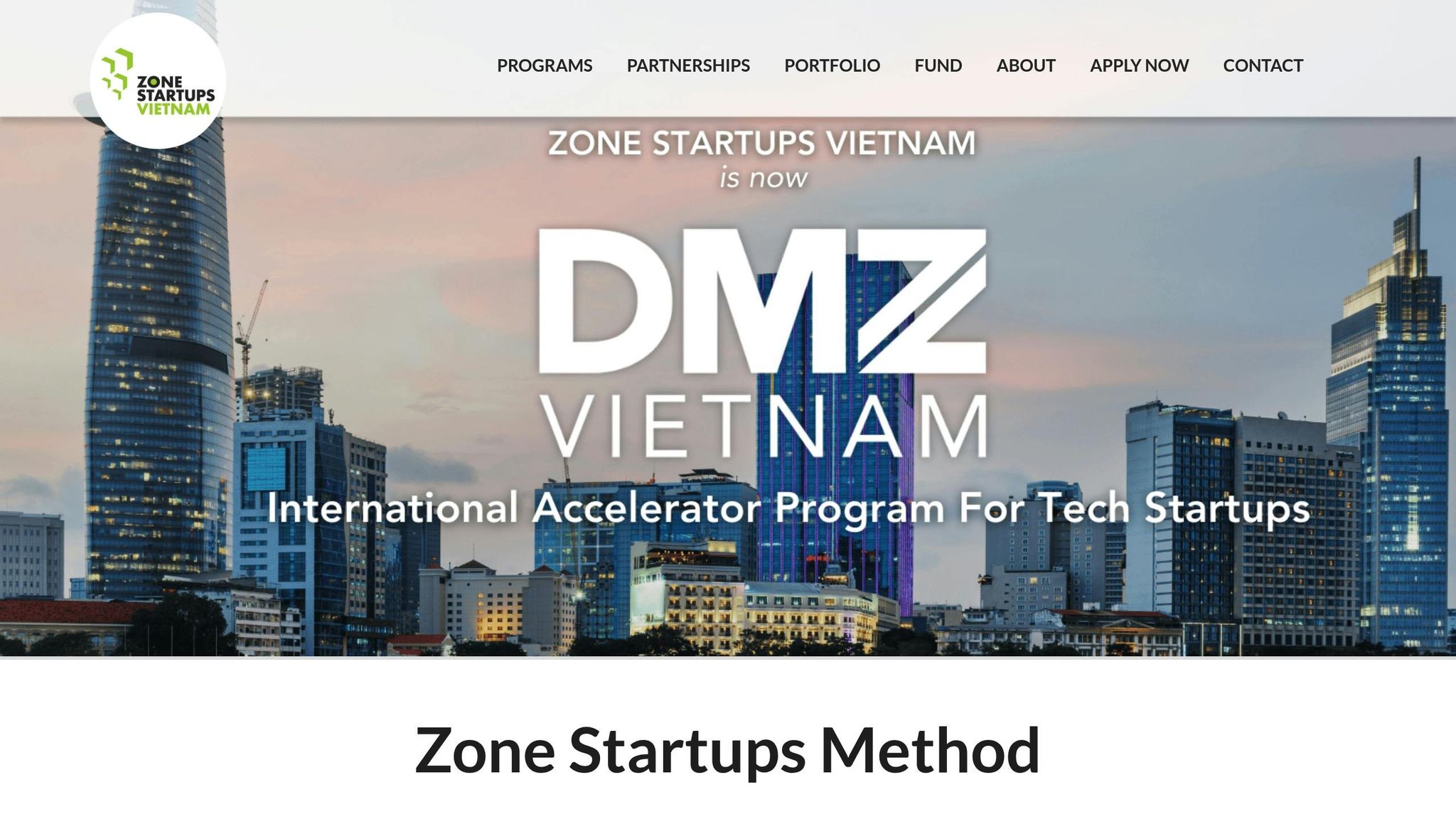Did you know? Vietnam now has over 3,800 startups, ranking 5th in Southeast Asia and 56th globally for its startup ecosystem. In this rapid growth, startup incubators play a crucial role in helping young companies overcome challenges and achieve sustainable development.
Quick Summary of Incubator Roles:
- Comprehensive support: Provides co-working space, mentoring, and investor connections.
- Various models: Traditional incubators, coworking hybrids, and social incubators.
- Addressing challenges: Helps startups secure funding, build skills, and scale their markets.
- Notable examples: Zone Startups Vietnam, ThinkZone Accelerator, BLOCK71 Saigon, Antler Vietnam.
Major Challenges Faced by Vietnamese Startups:
- Funding access: 90% of investment comes from abroad, but legal procedures are complex.
- Lack of skills: Many startups struggle with innovation and management.
- Product development: Staffing shortages and difficulty reaching target customers.
How Incubators Address These Challenges:
- Intensive training: Business planning, marketing skills, and fundraising guidance.
- Investor connections: Demo days, networking events, and seed funding support.
- Innovation boost: Increases startup survival rates and creates new jobs.
Conclusion: Incubators do more than just keep startups alive—they fuel Vietnam’s startup ecosystem, especially in the context of digital transformation and the national digital economy goals for 2025.
Zone Startups Vietnam – Comprehensive Startup Support Program

Key Challenges Vietnamese Startups Must Face
Vietnam’s startup ecosystem is growing rapidly, but the road ahead remains fraught with obstacles. From fundraising to product development and scaling, these challenges impact not only individual startups but the entire sector’s growth.
Fundraising Difficulties
One of the biggest hurdles is capital. With 90% of venture funding in Vietnam coming from foreign investors, access to these resources is more complex than ever[3].
In 2021, Vietnamese startups raised $1.4 billion in venture capital. By 2023, that figure fell to $529 million—a 17% drop year over year—and deal count declined by 40%, with sub-$500 K rounds down 50%[3].
High legal costs for restructuring to meet foreign investor requirements add further strain. As the 844 Project Office notes:
“When restructuring, Vietnamese shareholders must first invest abroad to form a parent company, then that parent invests back into Vietnam—a process common in emerging markets like Indonesia, Malaysia, the Philippines, and China.”[6]
Lack of Business Guidance and Specialized Skills
Beyond funding, startups face talent shortages and skill gaps. The education system isn’t fully preparing entrepreneurs, and formal support networks remain underdeveloped[7].
A Ho Chi Minh City study of 240 startups found only 32.5% innovated products or services; 67.5% struggled to generate new ideas[9].
Experienced hires in sales, marketing, product development, and operations remain scarce. David Yi of Ethos Fund observes:
“It’s relatively easy to launch in Vietnam but hard to scale. Most VCs focus on early stages, leaving a clear gap in growth-stage mentorship, capital, and operations.”[8]
By 2022, Vietnam faced a shortfall of 150 000 IT workers, rising to a projected 175 000 in 2023[10].
Market Access and Product Development
Identifying and convincing target customers remains a major challenge, especially in fragmented sectors like healthcare[12].
Regulatory compliance, data security, and system integration further complicate development. Lack of transparent information hinders investor and customer persuasion[11].
How Incubators Solve Startup Problems
To help startups overcome these common hurdles, Vietnamese incubators have developed end-to-end support—from skills training to investor matchmaking.
Business Training & Skill Building
Lacking business and specialized knowledge is a key barrier. Incubators run intensive training programs equipping entrepreneurs with the tools they need.
DNES Finc offers a 3-month roadmap with workshops and one-on-one sessions to validate market assumptions and refine business models, followed by mentor and investor introductions[14].
The Vietnam Innovative Startups Accelerator (VIISA) structures support into four phases: Pre-Acceleration, Build, Measure, and Scale—covering customer discovery, MVP development, and OKR-based performance tracking[14].
Specialized skill training is offered by Startup Wheel, which mentors top 100 candidates in business planning, branding, and fund-raising[14], and by WISE Accelerator, focusing on bootcamps for marketing, business development, and export for women-led ventures[14].
AEA Business Incubator delivers training from basic to advanced, covering general management and sector-specific skills in tourism, services, and agriculture[15].
Investor Connections & Funding Support
Incubators also bridge startups with investors to solve funding barriers.
Vietnam Silicon Valley Capital Accelerator (VSV Capital), launched in 2014 with government backing, offers seed grants, mentorship, and network access—having supported 130+ companies with 70+ investments[14].
Startup Wheel drives the community by awarding up to $1 000 000 in cash, office space, and demo opportunities—attracting investor attention and real funding pathways[14].
Demo days and networking events let startups pitch, fundraise, and gather market feedback. Programs like Zone Startups Accelerator accept only 1% of applicants, ensuring high quality and boosting selected startups’ appeal to investors[14].
Results of Incubator Programs in Vietnam
Incubator programs play a vital role in increasing startup survival rates, fostering innovation, and creating new jobs in Vietnam. Let’s explore how these programs make a difference.
Higher Survival Rate of Startups
Globally, up to 90% of startups fail, but those supported by incubator programs have a much higher chance of success thanks to workspace, mentoring, and seed funding[17].
In Vietnam, incubators like Songhan Incubator and Zone Startups Vietnam have proven effective at boosting startup survival. They support startups from day one with seed grants, business mentoring, and expanded market access[1][16]. These supports not only help startups survive but lay the foundation for sustainable growth.
Driving Innovation and Job Creation
Incubators act as bridges, connecting entrepreneurs with experts, researchers, and academic institutions to develop new business models and enhance competitiveness[2].
For example, ThinkZone Accelerator funds and mentors startups in fintech, e-commerce, and health tech; BLOCK71 Saigon provides collaborative space to link Vietnam and Singapore; Antler Vietnam helps founders validate ideas and prepare for subsequent funding rounds[1]. These activities not only boost innovation but also create new IT jobs, significantly contributing to the national economy[2].
Supporting Vietnam’s Digital Economy Goals
In the digital transformation era, incubators not only attract investment but also drive Vietnam’s innovation ecosystem. By providing capital, mentorship, and strategic networks, they help realize the “Digital Vietnam 2025” strategy[4][5].
Moreover, these initiatives support policies like ISEV, aiming to position Vietnam as a leading digital economy in the region[4]. Incubators don’t just nurture ideas—they fuel the comprehensive growth of the national digital economy.
Future Development & Recommendations for Incubators
To continue driving the startup ecosystem, incubators must embrace emerging technologies and build strategic partnerships. These solutions will further energize Vietnam’s startup landscape.
Adoption of Modern Technology
Artificial intelligence (AI) is becoming integral to incubator strategies. With the goal of making Vietnam an AI hub by 2030, the government has created opportunities for incubators to leverage this technology[18].
AI can help incubators predict market demand, optimize startup resources, reduce waste, and increase profitability[18]. AI chatbots streamline customer inquiries, while Vietnam’s AI retail sector is projected to grow 30% annually over the next five years. These trends present opportunities for startups to develop personalized customer experiences and smart inventory management[18].
Additionally, incubators should partner with universities to refine AI products and offer training programs, helping startup teams master these tools. This not only upskills entrepreneurs but also enhances support quality within the ecosystem[18].
Strengthening Public–Private Partnerships
Collaboration between government and industry is crucial for sustainable growth. The Vietnamese government is prioritizing public–private partnerships, aiming to cut business barriers by at least 30% by 2025[20]. A prime example is FPT, NIC, and Alchip Technologies co-founding the Vietnam Semiconductor Incubation Center to reduce business hurdles[23].
“This partnership lays the foundation for a robust ecosystem and sustainable talent pipeline, enabling Vietnam to keep pace with global tech trends.” – Nguyen Duc Tam, Deputy Minister of Finance[23]
Incubators should actively champion public–private ties to leverage resources and expertise from both sides. Linking large corporations with early-stage startups facilitates knowledge sharing, mentorship networks, and ecosystem strengthening[21][22].
Collaboration with Technology Service Providers
Partnering with professional technology service providers offers major benefits. SMEs represent 97% of Vietnamese businesses and contribute 45% of GDP[24].
For instance, Green Tech Incubator Vietnam awarded 6 startups with a $15,000 cash prize and AWS credits[24]. The Qualcomm Vietnam Innovation Challenge (QVIC), launched in 2019, has supported 29 startups with tech training, lab access, business mentoring, IP guidance, seed funding, and patent filing assistance[25].
Incubators can also partner with firms like Xenia Tech Solutions to help startups access digital transformation and enterprise software solutions. Such collaborations will be pivotal to the growth of Vietnam’s startup ecosystem.
Conclusion
Incubators are key to improving operational efficiency and shaping sustainable development for Vietnamese startups. By providing workspace, infrastructure, and connections to mentors and investors, they drive innovation and economic growth.
From around 1,600 startups at the start of the COVID-19 pandemic to over 3,800 by the end of 2022, supported by 79 incubators and 40 accelerators, Vietnam has become a regional startup hub—ranking 48th of 132 countries in the Global Innovation Index[19][26][27].
In 2024, innovation investment hit a record $2.3 billion across 141 deals—AI funding surged eightfold to $80 million[28]. This shows incubators propel both traditional and advanced tech startups.
Given targets of 18.3% GDP from the digital economy by 2025 and 35% by 2030[28], cooperation among government, industry, and tech organizations like Xenia Tech Solutions will unlock new opportunities for startups in Vietnam’s digital transformation.
Success can be measured by startup creation numbers and job growth in IT, digital marketing, and tech—offering career prospects for youth and a solid foundation for Vietnam’s vibrant startup ecosystem.
FAQs
How do startup incubators in Vietnam help young companies access funding?
Role of Incubators in Funding
In Vietnam, incubators are crucial for helping young startups overcome funding barriers. They connect entrepreneurs with investors, offer deep-dive mentoring, and teach effective fundraising strategies. This is key because many startups struggle to secure the capital they need.
Beyond funding, incubators guide startups in building solid business models and high-quality products. Through training, advice, and technical support, they enhance startups’ competitiveness, enabling them to attract venture capital and scale successfully.
How do incubator programs support the survival and growth of startups in Vietnam?
Role of Programs for Startup Survival
Incubator programs provide professional workspaces, intensive training, and investor networking, helping startups turn ideas into reality and build essential relationships. Studies show businesses in these programs have higher survival rates than those without such support. Additionally, they foster creativity, helping startups refine business models in Vietnam’s competitive market.
What are incubators doing to help Vietnamese startups leverage AI and drive digital transformation?
Incubators in Vietnam are launching AI-focused initiatives to support startups amid the digital and AI boom. Notably, specialized AI incubators in Ho Chi Minh City provide startups with critical resources, product development support, and industry partnerships. They also collaborate with international organizations to adopt modern incubation models and host the “Innovation” program to back thousands of startups—encouraging creativity and global integration. These efforts help startups apply AI effectively and accelerate Vietnam’s digital economy growth.“`




